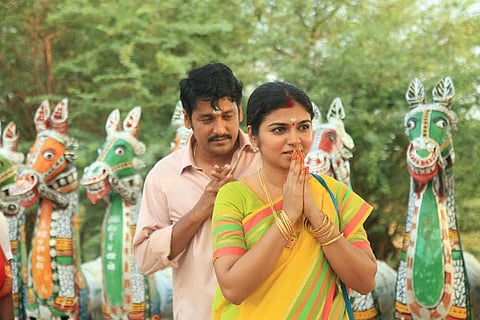
- Reviews
- Power List 2024
- Cannes 2024
- In-Depth Stories
- Web Stories
- News
- FC Lists
- Interviews
- Features
- FC SpecialsFC Specials

Language: Tamil
Director: Suresh Sangaiah
Cast: Vidharth, Raveena, George, Hello Kandasamy, Aarumugam
What kind of narrative could one weave from the story of villagers heading to a faraway temple in order to sacrifice a goat? A road movie, certainly, with every stop introducing quirky characters, startling contrivances. Or perhaps even a thriller, given that someone dies along the way, necessitating a cover-up. Suresh Sangaiah's impressive first feature, Oru Kidayin Karunai Manu (A Goat's Mercy Petition), has a bit of the former, a bit of the latter, but it is, at heart, an unusual beast. Let's just say this is what we might get if Bresson made an absurdist black comedy.
Ramamurthy (Vidharth) and Seetha (Raveena Ravi) are the ostensible leads, but the film is about the village of Naduvampatti — it's about everyone. And there are so many of them that it took me a while to settle into this little, self-contained eco-system, to get used to the (very funny) names and how this person was connected to that one.
I refer, of course, to Au Hasard Balthazar, that non-judgmental donkey's-eye-view of humanity's failings. I wouldn't go as far as to call Oru Kidayin Karunai Manu a remake (John Abraham's Agraharathil Kazhudhai came much closer) — just that it shares a sensibility, and that it views human failings through the eyes of that goat. Quite literally. An early scene is shot through the goat's point of view as it is led through the village, to the local butcher. On his table lies the head of another goat, the rest of it having been chopped up for food. We cut to this goat as it surveys the scene (and its eventual fate), but there's no reaction. No fear. No sympathy for the slain brother (or sister). If goats could shrug, that's what we'd get. It is what it is.
This stolid acceptance is constantly contrasted with the emotional volatility of man. Every time something happens, we cut to the animal. In filmmaking parlance, this is a reaction shot — only, there's no reaction. There's an accident. There are cops. There's violence. There's togetherness. There's the hypocrisy of going to temples and yet not caring about your fellow man (or animal), created by the same god. There's the mother's wail for a dead son. There's the bride's (somewhat) selfish concern for her husband. She sees a man whose clothes are in tatters, and instead of sympathising with him, all she can think about is where her husband is. But the film doesn't judge her, and neither do we (and needless to say, neither does the goat). In that situation, in that panic, maybe we'd behave similarly.
Ramamurthy (Vidharth) and Seetha (Raveena Ravi) are the ostensible leads, but the film is about the village of Naduvampatti — it's about everyone. And there are so many of them that it took me a while to settle into this little, self-contained eco-system, to get used to the (very funny) names and how this person was connected to that one. The director doesn't spoon-feed us by constructing clear-cut "introduction shots" for characters. Oru Kidayin is structured like a series of vignettes, with an emphasis on throwaway (as opposed to pointed) conversations. Seetha asks for a vadai. Ramamurthy says she should have had some puliyodarai (tamarind rice) that morning. She says she doesn't like tamarind rice. But the shop doesn't have vadais. He gets a puff. She makes a face. End of scene.
We get a sense of the everyday-ness of a certain kind of life, and this happens with each character, each one of whom is marvellously memorable. There are terrific bits throughout, like how a crime scene is navigated with plastic bags for gloves, or how people launch into elaborate preparations for a meal as though nothing has happened, or how a missing man makes his way back. While he's missing, alarmist theories abound. But it's really the least complicated, most logical explanation. He got lost. He flagged a bike down. He's back. We expect a revelation worthy of drama. We get… life.
Which isn't to say there's no drama. Just that the black comedy and the absurdism tamp things down, and give the film a shambolic vibe. Drama is tight, focused. Life is never as clear-cut. It's more chaotic. It's only in the end that the film trips up. The logical conclusion centres on what happens to the goat (as in the Bresson movie), but there's a mystifying coda that reiterates the obvious and gets into a messagey zone. For a film that so resolutely resisted any kind of comment, giving us only the "goat's point of view" (namely, no point of view), why this segue into "right" and "wrong," this lecture about vice and virtue?
But these last five-odd minutes apart, Oru Kidayin is a quiet gem. Suresh Sangaiah was Manikandan's assistant, and he's learnt well. Kaaka Muttai had the saddest of undercurrents, about what globalisation was doing to the poorest of the poor, but on the surface, it was funny, clever, cute as hell. It was nothing like what you'd imagine a "what globalisation is doing to the poorest of the poor" film to be. Oru Kidayin isn't as well-made (though the modesty of the craft is a perfect fit with the unassuming narration), but there's a similar sense of how to make the film you want while giving the general audience what they want. You don't need to know about Bresson or black comedy or absurdism, and you'll still have a damn good time.